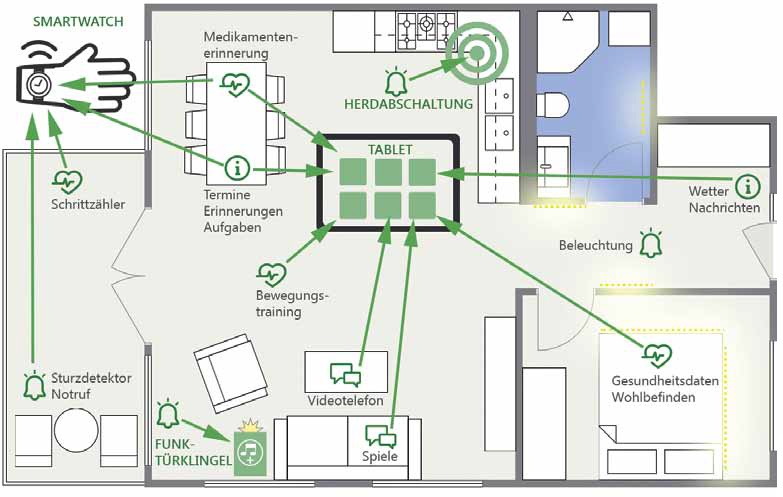RegionAAL - Effective Solutions for Remaining Living at Home
Short Description
The aim of RegionAAL, the Styrian Active Assisted Living (AAL) test region including the urban centres of Graz, Leibnitz and Deutschlandsberg, is to help older adults live for longer in their own surroundings. This will be achieved through the implementation of information and communication technologies that are likely to be actually accepted and used by the target group.
In order to meet this requirement, needs will be assessed via evidence analysis. Existing technologies will be adapted, extended and integrated into around one hundred households. Finally, the effectiveness of these assistance systems will be assessed in a one-year scientific evaluation.
Increased Quality of Life as a General Aim for Society
The aim of many older people is to remain in their own environment, enjoying the highest possible quality of life for as long as possible. This is also a societal aim which is echoed by many official bodies and organisations such as the World Health Organization (WHO), the Organisation for Economic Co-operation and Development (OECD) and the European Union.
However, the ageing process is typically associated with an increase in, and worsening of, both physical and mental chronic conditions including diabetes, high blood pressure and depression. This multimorbidity among older people is often accompanied by social isolation and associated with real or perceived need for help and assistance. This leads to a rising need for external support, in terms of personal care or social needs, in order to be able to remain living at home.
Scientific Evaluation of Effectiveness
Under the term Ambient Assisted Living (AAL), many innovative ICT technologies have been developed to support older people and tested on a small scale within research projects; however, only a few technologies have been successful so far. Why have relatively few of these technologies been successful? Could one reason be that they were not researched and developed with the specific needs and requirements of this particular population group in mind? The aim of RegionAAL is to take existing ICT elements, which are acceptable to this target group and have been proven fit for use, to develop them further and integrate them into a coherent structure.
The technology is then to be implemented in a study setting involving a scientific evaluation of effectiveness. RegionAAL integrates already available technologies which have been developed for a general population and implements them for older people in order to enhance their quality of life and allow them to remain in their own homes longer.
The technologies were chosen such that they can be used beyond the timescale of the project; an important point for those health service providers participating in the study. Homes, mostly in the urban area, will be equipped with supportive technologies and functions for instance,
- video communication,
- reminders for structuring of daily activities,
- fall detection or
- improved room lighting with the help of tablets and smartwatches
that have been identified through needs and evidence analyses. During a one-year scientific evaluation phase, acceptance and effectiveness (including the impact on objective and subjective health status and well-being) will be assessed.
Reducing the Burden for Caregivers and Increasing Care Time
Supportive technologies are only one aspect. Providing care and support through established social structures (friends and family) and formal care structures is essential. Personal contacts must not be replaced by technology. On the contrary, the aim of RegionAAL is to develop and implement technologies which not only support personal contacts but strengthen them by allowing time and resources to be diverted to other aspects of care and interaction. AAL technologies can potentially contribute to reducing the burden on informal caregivers (mostly women) and thus allow a longer stay in familiar surroundings.
Desired results of the RegionAAL project are:
- an evidence-based definition of the target population in terms of a clearly-defined need and the associated identification of types of AAL technologies that are likely to be effective in meeting this need;
- to find supportive technologies for those with particular needs that can help improve or maintain quality of life thus contributing to a delay in entering institutionalised care;
- to establish technological solutions for regional care providers so that technology and care services can be implemented in relevant facilities;
- to generate evidence of the acceptance of technologies and the degree to which they contribute towards solutions for the problems identified, via a scientific evaluation;
- an exchange of information with other AAL regions to enable mutual learning.
Project Partners
Consortium Manager
JOANNEUM RESEARCH
Forschungsgesellschaft m. b. H.
Further Project Partners
- Geriatrische Gesundheitszentren der Stadt Graz
- PWH Kirschallee GmbH
- Resch Elektrotechnik GmbH
- Sozialverein Deutschlandsberg
Contact Address
Project Coordinator
DI Kurt Majcen
E-mail: kurt.majcen@joanneum.at

